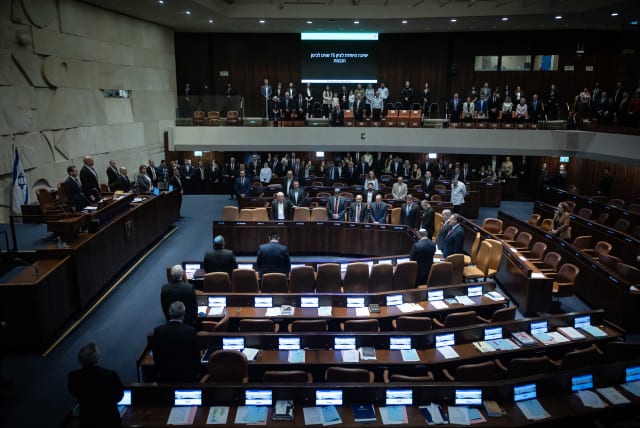Why was it a tumultuous week for Israel's coalition? - analysis

Noisy public infighting usually develops into an attempt by parties to leverage their position to score political victories.
From a political perspective, the past week was not an easy one for the governing coalition.
Nerves were frayed from the outset due to the continued nationwide state of high alert over an expected attack by Iran.
But added to this were three incidents that cranked up the tension a few notches: The attorney-general’s legal opinion on Sunday that military-age haredi men were no longer eligible to receive state subsidies for their children’s daycare; a visit by two Otzma Yehudit ministers to the Temple Mount during the fast of Tisha B’Av on Tuesday; and a coalition management glitch that enabled the opposition to strike down or delay an entire slate of legislation on Wednesday.
But despite all of the above, the current coalition has shown that rather than a real threat to its survival, noisy public infighting usually develops into an attempt by parties to leverage their position to score political victories.
The government has withstood heavy public pressure for months but has remained intact, and the events of this week are unlikely to be an exception.
The daycare subsidies are an especially serious problem for the haredi parties. The attorney-general’s explanation for canceling them is that the state can no longer continue to incentivize yeshiva studies for men who are now officially avoiding IDF service, being that the legal exemption for haredi men expired on July 23.
A heavy blow to haredim
In the past, the state attempted to incentivize haredim to enlist in the IDF by sanctioning yeshivot that did not meet a certain quota.
This time, however, the sanction is directed at each individual, who may now have to pay hundreds and even thousands more shekels a month for their toddler’s daycare.
Labor Minister Yoav Ben-Tzur (Shas) requested that the subsidies continue for one more year, and if not, at least until February to enable the haredi families and institutions affected by the issue to organize accordingly.
Ben-Tzur notified the government secretary on Thursday that he was in the midst of working with the attorney-general and other officials and requested that the matter not be discussed during Sunday’s government meeting.
But even if the subsidies remain in place for another few months, being that they may end soon could lead to a political crisis if the haredi parties decide they cannot be a part of a government that implements the measure.
Their problem, however, is that any other coalition would likely take even more steps to advance haredi enlistment in the IDF, and the haredi parties have nowhere else to go.
Trip to Temple Mount causes controversy
The visit to the Temple Mount by National Security Minister Itamar Ben-Gvir and Development of the Negev and Galilee and National Resilience Minister Yitzhak Wasserlauf was condemned by the Prime Minister’s Office and by the haredi parties, alongside the entire opposition.
The visit itself, according to the haredi parties, is halachically forbidden, and Ben-Gvir, as a representative of the government, was responsible for taking this into account.
More dangerous, however, were Ben-Gvir’s statements during the visit that the status quo had changed and that Jews could pray at the site.
The haredi parties attacked Ben-Gvir for what they said was an unnecessary provocation of the Muslim world, as did the Prime Minister’s Office, which also took issue with Ben-Gvir’s blatant attempt to override the authority of the security cabinet on a sensitive issue.
While dangerous, the visit and comments were not exceptional for Ben-Gvir.
In fact, he made similar comments during a visit nine days previous to the current one.
Prime Minister Benjamin Netanyahu and the haredi parties are used to Ben-Gvir’s antics and, therefore, are unlikely to take serious action against him.
While the week was tumultuous, even by the standards of the current government, which always seems to be in some sort of crisis, the 19 months since its inception have shown that it has staying power and will continue governing unless something truly exceptional happens – such as a hostage deal and cease-fire agreement.
Jerusalem Post Store
`; document.getElementById("linkPremium").innerHTML = cont; var divWithLink = document.getElementById("premium-link"); if (divWithLink !== null && divWithLink !== 'undefined') { divWithLink.style.border = "solid 1px #cb0f3e"; divWithLink.style.textAlign = "center"; divWithLink.style.marginBottom = "15px"; divWithLink.style.marginTop = "15px"; divWithLink.style.width = "100%"; divWithLink.style.backgroundColor = "#122952"; divWithLink.style.color = "#ffffff"; divWithLink.style.lineHeight = "1.5"; } } (function (v, i) { });

